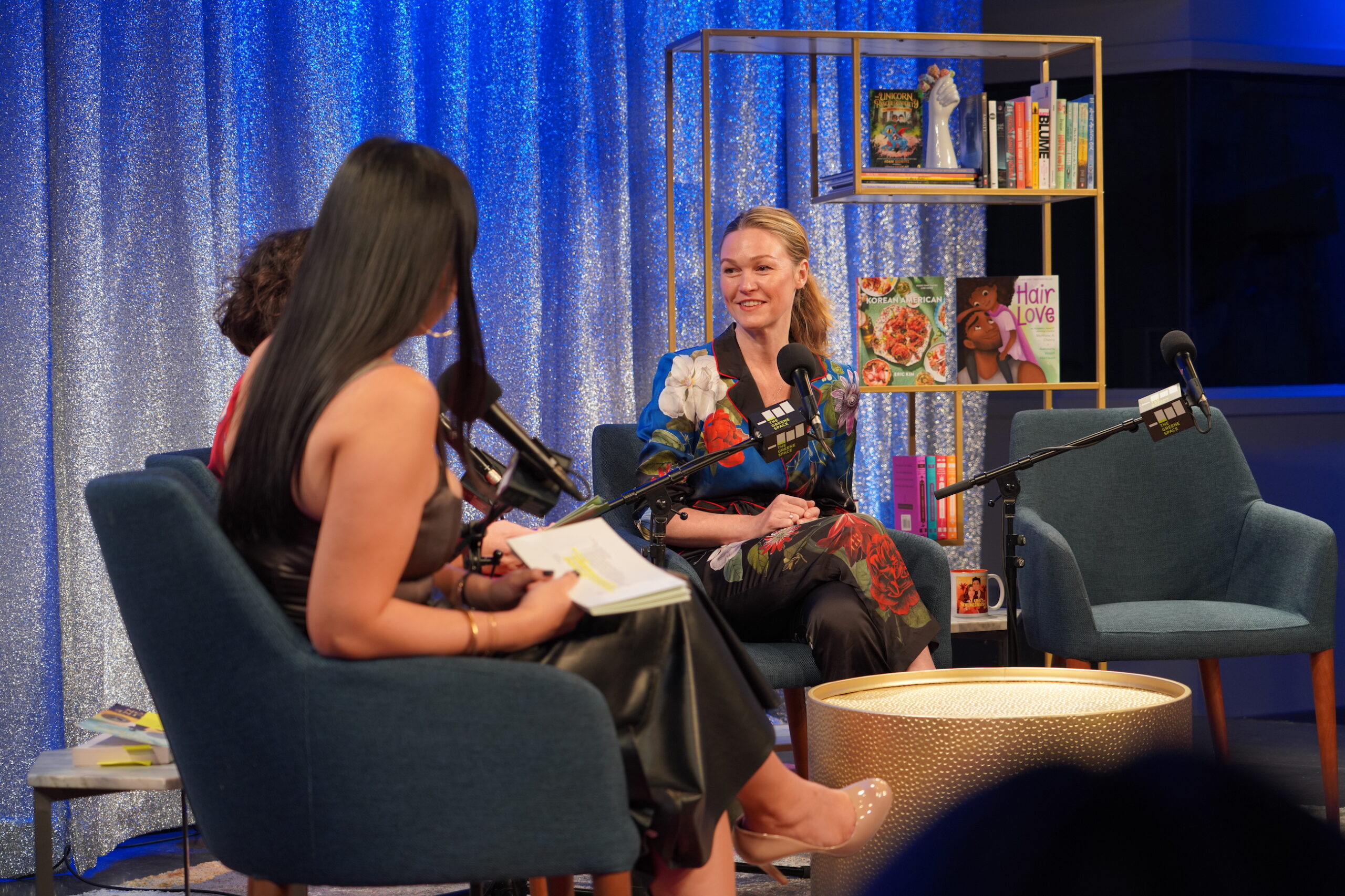10 Things We Love About Julia Stiles

OK, so it’s not 10 things we love about Julia Stiles. We love 1 million things about her. Julia Stiles is a dear friend of The Mash-Up Americans and when she joined us for The Mash-Up Americans Book Festival at The Greene Space (our final event as artist-in-residence!), we never set out to create a viral moment. But here we are!
We were lucky to have Julia read a selection of poems for us and our audience — including the sonnet from a little movie called 10 Things I Hate About You. Below is the clip of that iconic event, along with her other readings. Enjoy!
“The Beginning” from Brown Girl Dreaming, by Jacqueline Woodson
I cannot write a word yet but at three,
I now know the letter “J “
Love the way it curves into a hook
That I carefully top with a straight hat
The way my sister has taught me to do. Love
The sound of the letter and the promise
That one day this will be connected to a full name,
My own
That I will be able to write
By myself.
Without my sister’s hand over mine,
Making it do what I cannot yet do.
How amazing these words are that slowly come to me.
How wonderfully on and on they go.
Will the words end, I ask
Whenever I remember to.
Nope, my sister says, all of five years old now,
And promising me
Infinity.
From the Prelude of Can’t Stop Won’t Stop, by Jeff Chang
Generations are fictions.
The act of determining a group of people by placing a beginning and ending date around them is a way to impose a narrative. They are interesting and necessary fictions because they allow claims to be staked around ideas. But generations are fictions nonetheless.
There is nothing more ancient than telling stories about generational difference. A generation is usually named and framed first by the one immediately preceding it. The story is written in the words of shock and outrage that accompany two revelations: “Whoa, I’m getting old” and “Damn, who are these kids?”
Up until recently, our generation has mainly been defined by the prefix “post.” We have been post-civil rights, post modern, post structural, post feminist, post Black, post soul. We’re the poster children of POST, the leftovers in the dirty kitchen of yesterday’s feast.
So exactly when a Hip Hop Generation began and whom it includes, remains, quite appropriately, a contested question.
My own feeling is that the idea of the Hip Hop Generation brings together time and race, place and polyculturalism, hot beats and hybridity. It describes the turn from politics to culture, the process of entropy and reconstruction. It captures the collective hopes and nightmares, ambitions and failures of those who would otherwise be described as post-this or post-that.
So, you ask, when does the Hip Hop Generation begin? Whom does it include? Anyone who is down. When does it end? When the next generation tells us it’s over.
From “Buggin Out” by A Tribe Called Quest
Malik Izaak Taylor aka Phife Dawg
Yo, microphone check one two what is this
The five foot assassin’ with the ruff neck business
I float like gravity, never had a cavity
Got more rhymes than the ones that got family
No need to sweat Arsenio to gain some type of fame
No shame in my game ’cause I’ll always be the same
Styles upon styles upon styles is what I have
“Weep Up” by Maggie Smith
It’s only technically morning. Not even the birds believe it.
From her crib, my daughter tries to wake them, saying weep for wake.
Weep up, birds. What else could silence mean to her but sleep?
We might be the first awake on our street, the neighbors’ breathing still
Regular and slow, all the porches lit and moths losing their minds
In that light. Rising, spellbound in the blurry dawn, I become my mother
Twentieth-century sunrise was just like this — sad, soft-focus
Ocher like an overexposed Polaroid. The sun is just now brimming
Over the golden edge of the lawn, and the dew begins to sizzle there.
In the dark I hear weep up, weep up, birds, until they do.
“Why Write Love Poetry in a Burning World” by Katie Ferris
To train myself to find, in the midst of hell
what isn’t hell.
The body, bald, cancerous, but still
beautiful enough to
imagine living the body
washing the body
replacing a loose front
porch step the body chewing
what it takes to keep a body
going—
This scene has a tune
a language I can read a door
I cannot close I stand
within its wedge
a shield.
Why write love poetry in a burning world?
To train myself, in the midst of a burning world
to offer poems of love to a burning world.
A sonnet, by Kat Stratford, from the film 10 Things I Hate About You
I hate the way you talk to me,
and the way you cut your hair.
I hate the way you drive my car,
I hate it when you stare.
I hate your big dumb combat boots
and the way you read my mind.
I hate you so much it makes me sick,
it even makes me rhyme.
I hate the way you’re always right,
I hate it when you lie.
I hate it when you make me laugh,
even worse when you make me cry.
I hate it when you’re not around,
and the fact that you didn’t call.
But mostly I hate the way I don’t hate you,
not even close
not even a little bit
not even at all.





